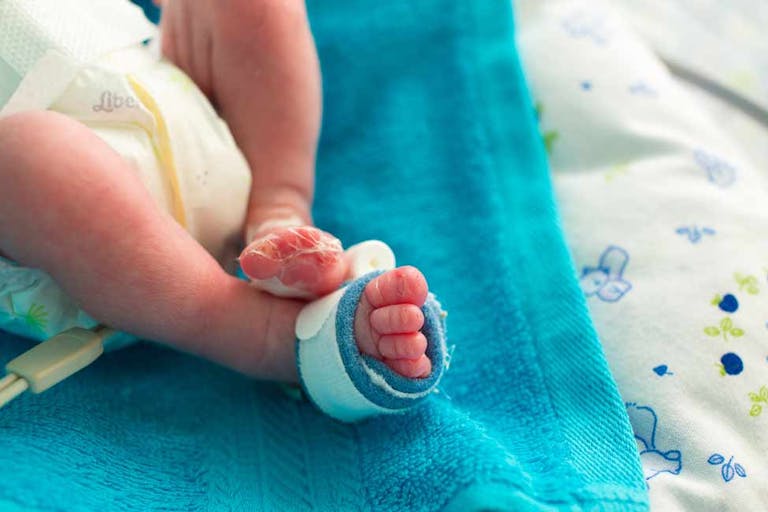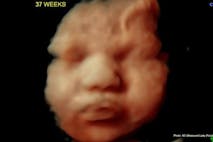
UK lawmaker: Pregnant woman should be allowed to undergo assisted suicide
Right to Life UK
·
She refused abortion after a fatal diagnosis: It was a ‘painful and wonderful journey’
Tracy Haugen was happily pregnant and attending her first ultrasound when she got terrible news – her child had a potentially fatal heart condition. In an article in Feminist for Life’s magazine The American Feminist, Haugen writes:
The day started with anticipation. It ended with voices ringing in our ears… “Your baby has a very serious heart defect. We are sorry but nothing can be done to fix it. If he makes it to term, he won’t live more than hours or a few days. We strongly suggest that you consider ending this pregnancy now so that you don’t prolong your suffering.”
Haugen seriously considered taking her doctors’ advice. She could not imagine the pain of losing her child after birth. In addition, the doctors offered to do her abortion by induction. Inducing labor early didn’t seem like an abortion to Haugen. It would kill the baby indirectly, unlike a D&E. It seemed natural. However, the baby was too young to survive, and the intent of inducing early labor was the baby’s death. It was merely an abortion by another method, albeit not the same as an actual induction abortion, widely used by late-term abortionists.

Haugen describes how torn she was:
I wish I could say the decision to continue, to carry this baby with “no hope” was automatic, but that isn’t the truth.
The truth is that I couldn’t imagine any of the options. Early induction was offered and seemed less like “termination” than a surgical abortion. 21 more weeks of planning a birth and a funeral at the same time seemed impossibly painful. Yet there was no way around the pain. I wanted out.
But then, a receptionist at the doctor’s office offered her some hope. The receptionist offered to introduce Haugen to a woman who had been in her shoes. This woman had continued her pregnancy. Haugen writes:
I was connected to a woman who had been given similar news two years earlier and had chosen to continue her pregnancy. We spoke on the phone and I heard something that surprised me. Her story was one of love and grief, joy and pain. She spared no details, sharing every aspect of her journey. She didn’t make trite statements or offer spiritual platitudes, but instead extended the hope that there can be beauty mixed with suffering.
The decision was made. I think the decision saved my life, not physically, but spiritually.
Suddenly, Haugen was not alone on her journey. She had someone else to guide her, someone who had lived through the loss of a child after birth. Haugen had thought that having a child with a fatal health problem, a child who would die soon after birth, would be an unbearable experience. Through the intervention of this other woman, she saw that while she would suffer great pain at her baby’s loss, there would also be joy and beauty, joy and beauty that would be lost if she decided on abortion.
READ: After her mother refused abortion, baby with half a heart is thriving
Article continues below
Dear Reader,
In 2026, Live Action is heading straight where the battle is fiercest: college campuses.
We have a bold initiative to establish 100 Live Action campus chapters within the next year, and your partnership will make it a success!
Your support today will help train and equip young leaders, bring Live Action’s educational content into academic environments, host on-campus events and debates, and empower students to challenge the pro-abortion status quo with truth and compassion.
Invest in pro-life grassroots outreach and cultural formation with your DOUBLED year-end gift!
Haugen’s doctor wasn’t thrilled about her decision to have her baby:
My doctor was so adamant I terminate that I had to ask if she would continue to be my doctor since I had chosen to carry to term. She agreed, but I could tell it scared her.
At the next ultrasound, there was some hope. The defect seemed to be improving. But the baby would still need immediate heart surgery after birth. Haugen writes:
At 36 and a half weeks, a beautiful boy, Davis Eric, entered the world. I was able to hold him for a moment before the neonatal team whisked him away. My husband, Dave, followed and Davis’s heart defect was officially diagnosed “Hypoplastic Left Heart Syndrome.” A big name for a big problem. Only a few babies survived the three-part surgery.
At five days old, Davis underwent the surgery. Tragically, he died soon afterwards:
We had held him, loved him, parented him in the ways we could. He survived only a few short hours after surgery. The doctors had done their best, we had done our best, and it was time to let him go. The pain was the deepest ache I have ever experienced. I still feel it sometimes. But this pain does not bear any regrets, any second thoughts, any “if onlys.” This pain doesn’t consume me from the inside out.
Davis is now the mother of two girls, and says, “we look back with gratitude and humility on our painful and wonderful journey.”
Losing Davis was very painful for Haugen, but she has no regrets. She feels grief, but no guilt. Spending time with Davis allowed her to say goodbye and have closure, a closure she would have been denied had she had an abortion. She has been left with a feeling of gratitude. Although her experience was painful, it was also “wonderful.”
Source: “Tracy Haugen” The American Feminist 2012, pp. 26 – 27
“Like” Live Action News on Facebook for more pro-life news and commentary!
Live Action News is pro-life news and commentary from a pro-life perspective.
Contact editor@liveaction.org for questions, corrections, or if you are seeking permission to reprint any Live Action News content.
Guest Articles: To submit a guest article to Live Action News, email editor@liveaction.org with an attached Word document of 800-1000 words. Please also attach any photos relevant to your submission if applicable. If your submission is accepted for publication, you will be notified within three weeks. Guest articles are not compensated (see our Open License Agreement). Thank you for your interest in Live Action News!

Right to Life UK
·
Human Interest
Nancy Flanders
·
Human Interest
Melissa Manion
·
Guest Column
Unplanned Stories
·
Human Interest
Nancy Flanders
·
Politics
Nancy Flanders
·
Guest Column
Sarah Terzo
·
Abortion Pill
Sarah Terzo
·
Guest Column
Sarah Terzo
·
Guest Column
Sarah Terzo
·
Guest Column
Sarah Terzo
·